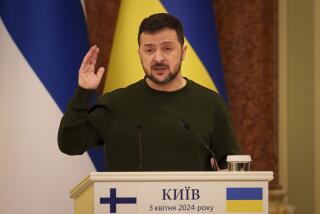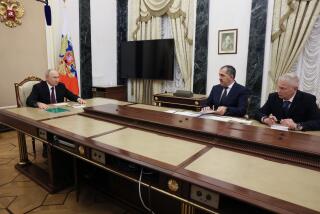Yeltsin Hawks Seek Elite Police Force, Paper Says
- Share via
MOSCOW — The shadowy and powerful hard-liners in President Boris N. Yeltsin’s inner circle are trying to consolidate their power by creating an elite National Guard to neutralize any internal threats, Russia’s leading newspaper reported Tuesday.
The article in the daily Izvestia was seen as the latest in a series of signals that Kremlin hawks and a resurgent KGB are trying--albeit fitfully and with resistance--to reimpose Soviet-style political controls on Russia.
In an explosive document leaked to the newspaper, Kremlin aides proposed the formation of a National Guard that would be independent of the army, loyal only to the president and capable of anticipating and quelling domestic uprisings. In short, the document seemed to describe an elite political police force of a type that has existed in Russia in one form or another since the reign of Ivan the Terrible.
According to Izvestia, the National Guard would be controlled by Gen. Alexander V. Korzhakov, Yeltsin’s former KGB bodyguard who now heads the Presidential Security Service.
The document has reportedly been sent to Yeltsin for his signature and “may be used when the right time comes,” the newspaper said.
Korzhakov, a mysterious figure who has been called a modern Rasputin and the head of a “Kremlin junta,” is believed by some intelligence sources to be more powerful and influential than his chief rival, Sergei V. Stepashin, director of the Federal Counterintelligence Service (FSK), the KGB successor agency.
“Korzhakov today is Russia’s No. 1 cop,” said retired KGB agent Oleg Kalugin. “Stepashin and the FSK are secondary.”
Korzhakov and such conservatives as Viktor V. Ilyushin, Yeltsin’s chief gatekeeper, Security Council Secretary Oleg I. Lobov and Deputy Prime Minister Oleg N. Soskovets are seen as the architects of Yeltsin’s Chechnya policy. They are also believed to have prevailed upon the president to distance himself from Russia’s squabbling democrats and take a more nationalistic line on such issues as arms sales, ties with the Baltics and the expansion of the North Atlantic Treaty Organization.
“The process of democratization in Russia is over,” journalist Yevgenia Albats said Tuesday. “Now we’re making the choice between chaos and authoritarian rule.”
Albats, author of a new book about the KGB titled “The State Within a State,” argues that the power struggle now under way is between different factions of the former military-industrial-intelligence complex, which remains as unreformed and dangerous to democracy as ever.
Others say that while Russia is heading into an authoritarian phase, political reform has gone far enough to rule out an old-style political crackdown.
But as Yeltsin’s unpopular war in the rebel republic of Chechnya enters its seventh week with no end in sight, hard-liners in the government appear emboldened.
Izvestia reported that the Byzantine presidential bureaucracy is setting up institutions that duplicate and supplant the official ones.
The idea of a National Guard--on top of Russia’s 10 other defense, police and security forces--was itself the brainchild of a shadowy “information-analytical center,” the newspaper said. This mysterious agency has replaced the official Presidential Analytical Center, whose advisers have become increasingly isolated, the newspaper said.
The proposal for a National Guard appeared designed to give Yeltsin an alternative to an army that was slow to come to his rescue in suppressing rebellious legislators in October, 1993, and that has been plagued by internal dissent, disobedience and incompetence in prosecuting the war in Chechnya.
More to Read
Sign up for Essential California
The most important California stories and recommendations in your inbox every morning.
You may occasionally receive promotional content from the Los Angeles Times.













